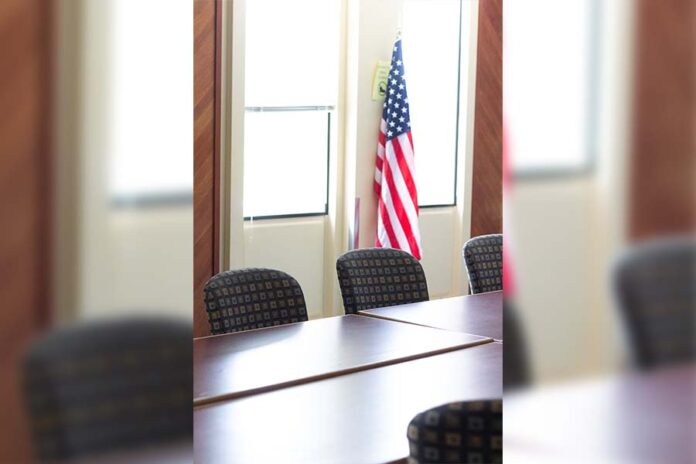Facing threats of violence for ECAC post, officials informally vote to cancel meeting
The Jan. 17 ASUCD Senate meeting has been cancelled due to safety concerns in the wake of widespread backlash from a controversial statement made by the Ethnic and Cultural Affairs Commission (ECAC) that made national headlines. The cancellation directly violates a requirement in the ASUCD Constitution that mandates meetings take place every week during Fall, Winter and Spring Quarters.
ECAC’s statement, which appeared via a post on its now-deleted Facebook page, criticized posts using what the commission deemed to be the Blue Lives Matter flag, which was circled widely on social media following the killing of 22-year-old Davis Police Officer Natalie Corona.
The commission’s statement was subject to hundreds of negative Facebook comments and received coverage from Tomi Lahren and Fox News. ASUCD officials have been subject to numerous threats of violence.
ECAC’s Chairperson Rina Singh is an ex-officio, or non-voting, member of the Senate table who is required to attend the weekly Senate meetings. A number of online commenters inquired as to when ASUCD’s public meetings were scheduled for and expressed interest in attending and voicing their opinions regarding the commission’s controversial statement.
On Sunday, Jan. 13, ASUCD officials began considering whether or not to proceed with this week’s Senate meeting, according to ASUCD Vice President Shaniah Branson. Associate Vice Chancellor Sheri Atkinson and ASUCD Business Manager Greg Ortiz advised student officials in making their decision.
“Over the course of the weekend, members and staff within the Association, including myself, had received threats of violence amongst demands of action to ‘punish’ those members of ECAC,” Branson said via email. “This was a difficult decision to make but I believe safety of members on the table takes priority.”
According to the ASUCD Constitution: “The Senate shall officially hold ‘regularly scheduled’ meetings weekly during Fall, Winter, and Spring Quarter.”
There is some precedent within the association for cancelling Senate meetings.
“Most recently during the campus closure, ASUCD Senate did not meet over a two-week period for safety reasons [due to the smoke hazard in Davis],” Ortiz said.
Branson, however, acknowledged the lack of guidance in the Constitution and Bylaws for what to do in a situation such as this. She said her number one priority rests with ensuring the “safety of those on the table despite governing documents.”
“They exist to provide structure to Associations such as ASUCD, [so] … although we have these governing documents in place to maintain guidelines of the Association, the standard to uphold them should be lowered in cases as such,” she said. “Especially with the threat to student safety.”
Not everyone in the association was pleased with the decision. The now-former chief of staff for the ASUCD Executive Office, who wished to remain anonymous, submitted their resignation after what they determined to be a “botched response” by the association following Corona’s death — characterized chiefly by a lack of a meaningful response to the incident.
“Instead we have done nothing more than make ourselves a statewide, and now nationwide, pariah by spilling our internal arguments and drama onto social media with little thought as to how that would affect our community or those who wished to celebrate the life of Natalie Corona,” the individual said in their resignation letter from the association.
After working to prepare legislation related to the incident and meant to be introduced this week, the anonymous individual said student government officials voted “in violation of ASUCD’s bylaws” via a social media poll to cancel this week’s Senate meeting.
“Those who voted to cancel the meeting include individuals who were highly criticized for their response to the shooting and simply did not want to deal with further public criticism,” the individual said. “I think it is wrong to act with a lack of transparency to delay dealing with controversial events until after the public has lost interest. Officials in ASUCD should be accessible and accountable when it comes to matters of public interest, but sadly this does not seem to be the current state of the Association.”
Chapter 3, Section 300 of the ASUCD Bylaws forbids a majority of members of the legislative body from using “a series of communications of any kind” to “engage in conversation that develops collective concurrence on any item of business that is within the subject matter jurisdiction of the legislative body.”
According to the former chief of staff, the cancellation of this week’s meeting — done via social media — “would qualify as collective concurrence developed outside of an authorized meeting.” This would mean the cancellation itself is unconstitutional and it became unbylawful as well due to the manner in which it was done.
Moving forward, Branson said she “plans to amend the governing documents” to remove “ambiguity” in the case that a meeting must be cancelled.
Agenda items that will not be taken up this week will be pushed to the next ASUCD Senate meeting.
Written by: Kenton Goldsby — campus@theaggie.org





How, exactly, can someone ‘wish to remain anonymous’ who has a position where their name can be easily looked up online?
I don’t think on this matter the public interest is going to fade all that fast.
Ironically, I quite imagine the next ASUCD meeting will be protected by armed police officers to ensure the safety of the student electeds, including those on the ECAC.